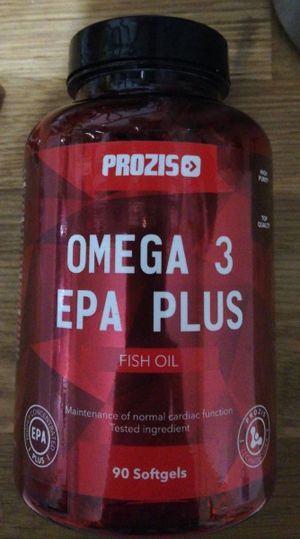Eicosapentaenoic acid

Eicosapentaenoic acid (EPA) is an Omega 3 fatty acid found in fish oil. A precursor to DHA, it is anti-inflammatory and may be neuroprotective.
Immune system[edit | edit source]
EPA inhibits the production of arachidonic acid (AA) and its related pro-inflammatory prostaglandins by competing for the delta-5-desaturase enzyme that produces AA. The more EPA you have in your diet, the less AA you produce. EPA also competes with phospholipase A2, necessary to release AA from cell membranes, a similar mechanism of action to corticosteroids. The eicosanoids produced from EPA are less active than those produced from AA. A high EPA/AA ratio is anti-inflammatory.[citation needed]
EPA inhibits the expression of pro-inflammatory mediators in microglia, including nitric oxide, prostaglandin E2 and pro-inflammatory cytokines IL-1β, IL-6, and TNF-α in lipopolysaccharide-induced activation.[1] Several studies have found both EPA and DHA inhibit microglia activation.[2]
In culture, EPA inhibits prostaglandin D2, a prostaglandin found in large amounts in the brain and in mast cells.[3]
Nervous system[edit | edit source]
EPA is found in very low levels in the brain (in contrast to DHA, which is the primary structural Omega 3 in the brain and found in abundance). However, EPA still has important neurological and psychiatric effects.
EPA inhibits Phospholipase A2 (PLA2), an enzyme that breaks down phospholipids, the major component of cell membranes. Increased PLA2 activity has been observed in the cerebrospinal fluid of patients with Alzheimer's[4] and multiple sclerosis.
Some animal studies have found that fish oil increases dopamine, which may be low in CFS patients.[5][6][7]
Chronic fatigue syndrome[edit | edit source]
One study found CFS patients had low EPA/AA and Omega3/Omega 6 (ω3/ω6) ratios.[8]
EPA is a theorized treatment for CFS owing to its immunomodulatory and anti-inflammatory effects. Trial results have been mixed.
Autoimmune disease[edit | edit source]
A meta-analysis demonstrated significant improvements with fish oil supplementation for rheumatoid arthritis patients.[9] Oral supplementation of EPA and DHA induced prolonged remission of lupus in ten patients.[10]
See also[edit | edit source]
References[edit | edit source]
- ↑ Moon, Dong-Oh; Kim, Ki-Cheon; Jin, Cheng-Yun; Han, Min-Ho; Park, Cheol; Lee, Kyeong-Jun; Park, Yeong-Min; Choi, Yung Hyun; Kim, Gi-Young (February 2007), "Inhibitory effects of eicosapentaenoic acid on lipopolysaccharide-induced activation in BV2 microglia", International Immunopharmacology, 7 (2): 222–229, doi:10.1016/j.intimp.2006.10.001, ISSN 1567-5769, retrieved November 9, 2016
- ↑ Hjorth, Erik; Freund-Levi, Yvonne (March 2012), "Immunomodulation of microglia by docosahexaenoic acid and eicosapentaenoic acid", Current Opinion in Clinical Nutrition and Metabolic Care, 15 (2): 134–143, doi:10.1097/MCO.0b013e32835017cc, ISSN 1473-6519, PMID 22316559
- ↑ Obata; Nagakura; Masaki; Maekawa; Yamashita (August 1, 1999), "Eicosapentaenoic acid inhibits prostaglandin D2 generation by inhibiting cyclo-oxygenase-2 in cultured human mast cells", Clinical & Experimental Allergy, 29 (8): 1129–1135, doi:10.1046/j.1365-2222.1999.00604.x, ISSN 1365-2222, retrieved November 9, 2016
- ↑ Chalbot, Sonia; Zetterberg, Henrik; Blennow, Kaj; Fladby, Tormod; Andreasen, Niels; Grundke-Iqbal, Inge; Iqbal, Khalid (January 1, 2011), "Blood-Cerebrospinal Fluid Barrier Permeability in Alzheimer's Disease", Journal of Alzheimer's disease : JAD, 25 (3): 505–515, doi:10.3233/JAD-2011-101959, ISSN 1387-2877, PMC 3139450, PMID 21471645, retrieved November 9, 2016
- ↑ Chalon, Sylvie; Delion-Vancassel, Sylvie; Belzung, Catherine; Guilloteau, Denis; Leguisquet, Anne-Marie; Besnard, Jean-Claude; Durand, Georges (December 1, 1998), "Dietary Fish Oil Affects Monoaminergic Neurotransmission and Behavior in Rats", The Journal of Nutrition, 128 (12): 2512–2519, ISSN 0022-3166, PMID 9868201, retrieved November 9, 2016
- ↑ Innis, Sheila M.; Owens, Sylvia de la Presa (January 1, 2001), "Dietary Fatty Acid Composition in Pregnancy Alters Neurite Membrane Fatty Acids and Dopamine in Newborn Rat Brain", The Journal of Nutrition, 131 (1): 118–122, ISSN 0022-3166, PMID 11208947, retrieved November 9, 2016
- ↑ Shin, Samuel S.; Dixon, C. Edward (June 8, 2011), "Oral fish oil restores striatal dopamine release after traumatic brain injury", Neuroscience Letters, 496 (3): 168–171, doi:10.1016/j.neulet.2011.04.009, ISSN 0304-3940, retrieved November 9, 2016
- ↑ Maes, Michael; Mihaylova, Ivana; Leunis, Jean-Claude (December 2005), "In chronic fatigue syndrome, the decreased levels of omega-3 poly-unsaturated fatty acids are related to lowered serum zinc and defects in T cell activation", Neuro Endocrinology Letters, 26 (6): 745–751, ISSN 0172-780X, PMID 16380690
- ↑ Fortin, Paul R.; Lew, Robert A.; Liang, Matthew H.; Wright, Elizabeth A.; Beckett, Laurel A.; Chalmers, Thomas C.; Sperling, Richard I. (November 1, 1995), "Validation of a meta-analysis: The effects of fish oil in rheumatoid arthritis", Journal of Clinical Epidemiology, 48 (11): 1379–1390, doi:10.1016/0895-4356(95)00028-3, ISSN 0895-4356, retrieved November 9, 2016
- ↑ Das, U.N. (September 1, 1994), "Beneficial effect of eicosapentaenoic and docosahexaenoic acids in the management of systemic lupus erythematosus and its relationship to the cytokine network", Prostaglandins, Leukotrienes and Essential Fatty Acids, 51 (3): 207–213, doi:10.1016/0952-3278(94)90136-8, ISSN 0952-3278, retrieved November 9, 2016

